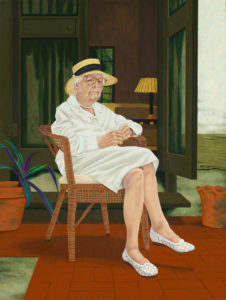Humanist Women in History: Marjory Stoneman Douglas
“I believe that life should be lived so vividly and so intensely that thoughts of another life, or of a longer life, are not necessary.”
—from Marjory Stoneman Douglas: Voice of the River (1987)

Marjory Stoneman Douglas portrait by Menden Hall (National Portrait Gallery, Smithsonian Institution; gift of the Friends of the Everglades)
Environmental writer and activist Marjory Stoneman Douglas was born on April 7, 1890, in Minneapolis, Minnesota. She was the only child of Frank Bryant Stoneman, future publisher of the newspaper that would become the Miami Herald, and concert violinist Florence Lillian Trefethen. Her parents separated when she was six, after which Marjory lived with her mother, who suffered mental health issues and died from breast cancer in 1912, just months after Marjory graduated with honors and a BA in English from Wellesley College.
Marjory Stoneman had a short-lived marriage to Kenneth Douglas, and then in 1915 she moved to Florida to live with her father and stepmother, Lilla Shine. She joined the staff of her father’s newspaper and was soon writing for the editorial page. After a stint in the Navy and then working for the Red Cross in Paris during World War I, Stoneman Douglas returned as assistant editor at the Miami Herald and gained a following for her daily column, “The Galley.” According to biographer Jack Davis, her column advocated for, among other things, responsible urban planning, women’s suffrage, civil rights, and better sanitation and opposed Prohibition and foreign trade tariffs.
After leaving the paper in 1923, Stoneman Douglas spent the rest of her seven-decade writing career publishing fiction for the Saturday Evening Post and other outlets, as well as plays. According to Davis, her protagonists were often “independent, quirky women or youthful underdogs who encountered social or natural injustices,” and were often set in the Florida Everglades.
That setting also led to her groundbreaking 1947 nonfiction book, The Everglades: River of Grass. The bestseller was the culmination of five years researching the ecology and history of the unique wetlands in South Florida, which Stoneman Douglas eloquently argued were an invaluable aspect of the area’s culture. She fought for the conservation of that ecosystem for the rest of her life, establishing the Friends of the Everglades in 1969 at the age of seventy-nine. As the group’s leader she opposed a large group of sugarcane growers whose practices were polluting Lake Okeechobee, a major source of water for the Miami metro area, and took on the Army Corps of Engineers for diverting needed water away from the Everglades.
St. Petersburg Times reporter Jeff Klinkenberg said of Stoneman Douglas: “She had a tongue like a switchblade and the moral authority to embarrass bureaucrats and politicians and make things happen.” A champion of migrant workers, the American Civil Liberties Union, and the Equal Rights Amendment, Stoneman Douglas had a keen understanding of the relationship of people to place, and of environmental justice. As a member of the Coconut Grove Slum Clearance Committee, she was instrumental in getting running water and sanitary plumbing to a racially segregated part of the area and helped set up an interest-free loan program to help black residents get the plumbing they deserved.
Stoneman Douglas received many awards for her writing and her activism. In 1980 the Florida Department of Natural Resources named its headquarters in Tallahassee, Florida, after her. Incidentally, she reportedly told a friend she would’ve preferred having the Everglades restored to her name on a building and used her acceptance speech to lambast then-President Ronald Reagan and Interior Secretary James Watt for their inadequate attention to the environment and to environmental conservation. When she turned 100, Majory Stoneman Douglas high school in Parkland, Florida, was named after her and in 1993 Bill Clinton awarded her with the Presidential Medal of Freedom.
Stoneman Douglas died at the age of 108 on May 14, 1998. A self-described agnostic throughout her life, she had forbidden any religious ceremony at her memorial. “The soul is a fiction of mankind, because mankind hates the idea of death. It wants to think that something goes on after,” she wrote in her 1987 autobiography (written with John Rothchild). “I think death is the end. A lot of people can’t bear that idea, but I find it a little restful, really.”
